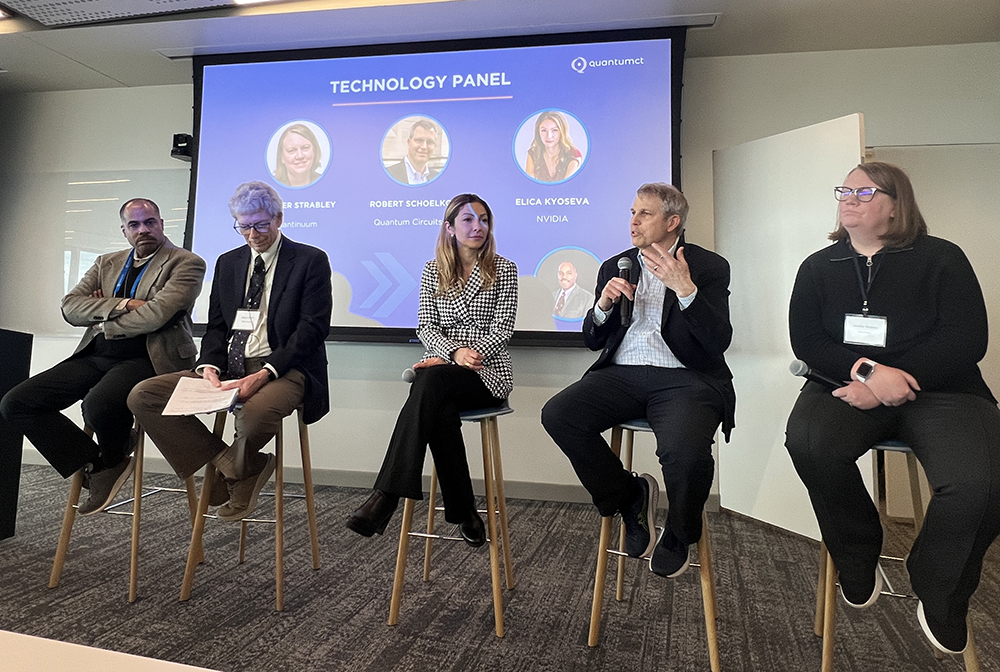Yale and Connecticut Showcase Quantum Strength During Yale’s Quantum Week

A full house gathered in New Haven on April 15 for the QuantumCT Industry Collaboration Forum, a signature event during Quantum Week at Yale—a weeklong celebration of Yale's growing leadership in quantum science. Hosted by QuantumCT and part of the International Year of Quantum Science and Technology, the forum marked an important milestone in Connecticut’s growing reputation as a national hub for quantum innovation.
Held at the intersection of academia, industry, and state leadership, the event was designed to ignite collaboration in two of the region’s strongest sectors: biotech/pharma and aerospace/defense.
A State Committed to Innovation
The day opened with remarks from Daniel O’Keefe, Commissioner of the Department of Economic and Community Development and the State of Connecticut’s Chief Innovation Officer. O'Keefe emphasized Connecticut’s unique position to drive quantum technology development through public-private-academic partnerships. “Quantum is not just a research opportunity—it’s an economic development opportunity,” he noted, highlighting initiatives like the QuantumCT Computational Testbed, designed to offer infrastructure and support for use-inspired research and commercialization.
Spotlight on the Quantum Technology Panel
Moderated by Albert Green, CEO of QuantumCT, and Steven Girvin, Yale Sterling Professor of Physics, the Quantum Technology Panel brought together pioneering voices in quantum innovation: Elica Kyoseva, Quantum Platform Software Lead at NVIDIA, Jennifer Strabley, Commercial Operations Director at Quantinuum, and Robert Schoelkopf, Founder of Quantum Circuits Inc. (QCI) and Sterling Professor of Applied Physics at Yale.
Together, the panel explored how quantum computing is evolving from the lab bench to real-world applications—faster than many imagined.
“We are building a full-stack system—our model is quantum-as-a-service, available via the cloud,” said Schoelkopf, whose startup QCI has raised over $85 million and employs 70 people. “The horizon is closer than it appears.”
Strabley added, “The future of quantum is in collaborative development. Advances in hardware, algorithms, and error correction must move together. That’s why QuantumCT’s testbed and Yale’s research leadership are so critical.”
The panelists discussed real-world quantum applications in drug discovery, materials science, machine learning, and optimization—with use cases ranging from modeling magnetic materials to generating perfectly random numbers for secure communications. NVIDIA highlighted how quantum chemistry calculations are already finding traction across the pharma industry.
Forging New Collaborations
The forum didn’t stop at ideas—it set the stage for action. An ideation session brought together academic researchers, startup leaders, and corporate stakeholders to explore hybrid classical-quantum architectures. Later, faculty from Yale and UConn presented early pilot projects co-developed with industry partners, illustrating how Connecticut’s universities are fast becoming engines for applied quantum R&D.
Throughout the day, strategic networking sessions enabled stakeholders to forge connections that could evolve into future projects, investments, or startups. The discussion around quantum education and workforce development was particularly resonant. “We need K-12 quantum literacy and upskilling programs,” said Green. “That’s one of QuantumCT’s core missions.”
Quantum Week at Yale: A Celebration of Science and Society
The Industry Collaboration Forum was one of the flagship events during Quantum Week at Yale (QWAY)—a vibrant, inclusive celebration created by Florian Carle of the Yale Quantum Institute. Running from April 10–17 and timed to World Quantum Day (April 14), QWAY featured events designed to demystify quantum science and open its doors to the public.
With events hosted across campus and the broader New Haven community, QWAY was a collaboration among over a dozen Yale and Connecticut partners, including the Connecticut Center for Arts and Technology, Connecticut Science Center, Yale Ventures, the Yale SOM AI Association, and many more. Visual design for the week was led by Martha W. Lewis and Carle, reflecting the creative and interdisciplinary spirit of the initiative.
Connecticut’s Quantum Moment
With growing startup activity, academic excellence, and support from state leadership, Connecticut is emerging as a serious player in the quantum landscape. The QuantumCT Industry Collaboration Forum exemplified the potential of strategic coordination: aligning researchers, entrepreneurs, corporations, and policymakers around shared goals.
As Jennifer Strabley noted, “Quantum isn’t just about what’s possible—it’s about what’s next. And what’s next is being built right here in Connecticut.”
Learn more about Quantum at Yale and Connecticut:
Related news:
Yale News: A week devoted to quantum, quantum, and more quantum
Hartford Business Journal: Connecticut hosts quantum conference
Quantum at Yale:
Quantum Circuits, a Yale spinout founded by Professor Robert Schoelkoepf
